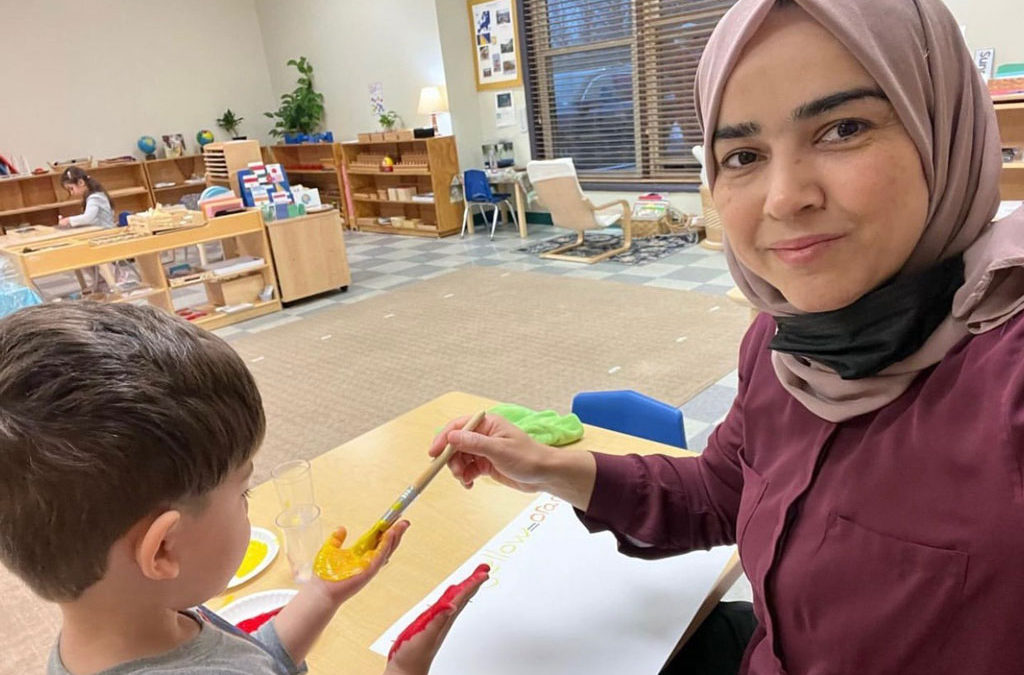By: Fatema Rehmani and Ulaa Kuziez
After twelve years of teaching traditional Islamic early childhood education, Ustatha Maryam Farzam gained her Montessori certification, transforming her personal and professional perspective on how to nurture a child in a learning environment.
“I wanted to become a Montessori certified teacher because throughout my many years of teaching, I felt like something was missing. In the traditional way, there was a lot of direction. We provided everything for every child. All the materials were the same, and some children were struggling, but I never knew about it,” Farzam said.
Farzam first became interested in Montessori when her Director, Ustatha Marah Zabibi, completed the training in 2016 and started to incorporate elements of Montessori philosophy into their school. As of 2022, the Al-Salam Day School Early Childhood Center (ADS ECC) is certified in Islamic Montessori Education (IME) from the American Islamic Montessori Association (AIMA). Seven teachers, including Farzam, have earned their Montessori credentials.
“Our director and a few teachers got their training the year before me. I was observing them because I was very curious and I couldn’t wait to start it the following summer. It was a completely different feeling and teaching style. Seeing the children touching the materials without giving them any direction—it was amazing. And it still is.”
After an entire summer of training at Hope Montessori Educational Institute, and attending a few seminars sprinkled throughout the school year, Farzam attained accreditation in June 2018. When she began incorporating the Montessori method, Farzam instantly felt a difference.
“I’m so glad that I took the training because I remember going to work with happiness. My favorite activities are practical life activities, like pouring. Children love water and pouring from one cup to the other. Another activity is flower arranging. Children love touching fresh flowers because they’re bright and they get to use scissors. Without noticing, these activities are preparing children for skills like writing and doing math as well, so it’s really neat.”
One of the central goals of Montessori teaching is fostering a nurturing classroom environment. Using a holistic framework, Farzam builds her classroom to value cognitive, psychological, social, and spiritual development.
“The traditional education system only focuses on the core curriculum standards. Children should know how to count from one-to-ten and they should know the alphabet, A-to-Z. I remember once there was a child who came to the classroom and threw up every morning. He wasn’t physically sick, so we didn’t know why. Of course, we tried many things to help the child. Years later when I got the training, I realized the child wasn’t ready for the paper, and that’s what made him sick: just seeing that work in front of him at four years old.”
IME is unique in recognizing the powerful combination of Montessori and Islamic principles, and this is something that Farzam incorporates in daily classroom activities.
“When we teach our children subjects like math and science, we are teaching students about Allah’s (SWT) creation. Children grow not to see religion and God as a separate part of their lives, but as a way of looking at the world, one that permeates everything in the universe. Our director encouraged us to start our circle time by reciting surah Fatiha or Ayat-ul-kursi. I love it because it is good for the kids and for me. I noticed a couple of children memorized Ayat-ul-kursi and they were so happy that they were reciting by themselves.”
Farzam emphasizes the values she wants to imprint on her students: grace and courtesy, politeness, respect for self, respect for others, and respect for the world around them—all in the hope of developing a love of learning, becoming genuine people and model Muslims.
“Montessori philosophy has taught me a lot about myself. Also, it helped me with how I now talk to my grown up daughters and to my grandchildren. Every child has their own uniqueness. From each child, every year, I’m learning something new.”


